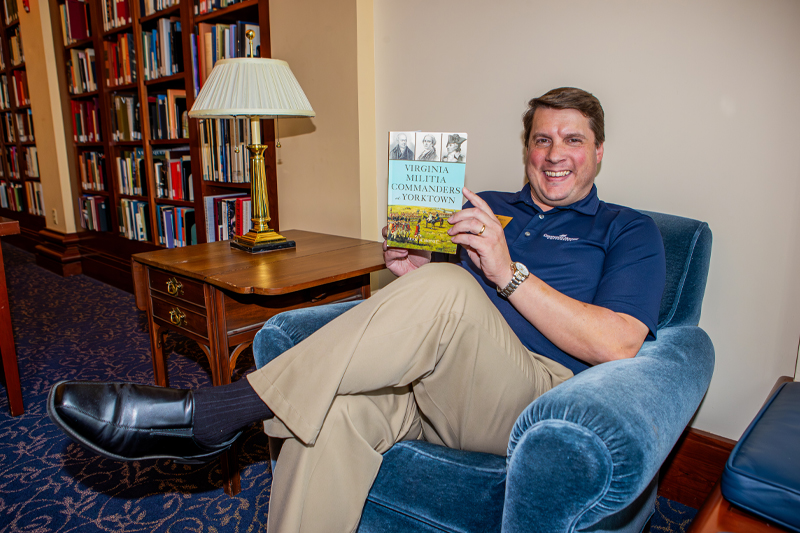
Read time:
Dr. Sean Heuvel is an avid history buff who loves sharing knowledge and educating others about the past.
So when he stumbled across a personal connection while doing genealogical research – a pair of his relatives from the Shenandoah Valley served together as privates in the Virginia militia at the Siege of Yorktown during the American Revolution – he was both intrigued and excited.
He had no idea that he had family in the militia, much less at Yorktown. That historical morsel whet his history appetite and he started to dig deeper.
“I wanted to learn more,” said Heuvel, Christopher Newport’s director of Graduate and Professional Enrollment and director of Institutional History. “After all, the Siege of Yorktown was an iconic moment in American history.”
The Siege of Yorktown proved to be a decisive battle in 1781 that helped end the Revolutionary War. The Yorktown Battlefield is located just 10 miles from campus.
What Heuvel discovered about the militia members was so enlightening and interesting that he decided to write a book so he could share his newfound knowledge with history enthusiasts around the world.
On Oct. 7, “Virginia Militia Commanders of Yorktown” will hit bookstores nationwide. The book focuses on 28 militia officers who served in Yorktown, delving into who they were, why they fought, and what happened to them after the Revolutionary War.
The Virginia militia, a force made up of citizens, comprised 40 percent of the allied force at Yorktown. It included men from Virginia and what is now West Virginia. The militia played a key role in Yorktown, not only fighting, but constructing earthworks and redoubts, which were fortified structures built into the ground to help protect soldiers during war.
From a historical perspective, Heuvel knew about the militia's role during the siege, but what he was most intrigued by were about the people behind it, the personalities and the life stories of the officers who led and fought.
But as Heuvel started his search, he realized there was not a lot of information about the militia members to be had. Many of the records were lost when buildings were destroyed during the Civil War.
Heuvel had to be creative, thinking outside the research box. He decided to take a chance and look at digitized pension records available through the Southern Campaigns Revolutionary War Pension Statements and Rosters Database.
It worked. Using keyword searches, he was able to piece together profiles of the officers. As a historian, he began to recognize names and one bit of information led to another.
“It was very much a puzzle,” Heuvel said.
It took Heuvel a year to research the history and another year to write the book. He hopes “Virginia Militia Commanders of Yorktown” will not only shed light on a moment in military history that was important to the future of Virginia and the nation, but also educate people on who the heroes of the time were, what motivated them, and how their actions changed the course of the country.
As he began piecing together the officers’ stories, the fascinating details of their lives emerged, and connections between many of them and historical events became clear. The research brought into focus just how history intertwines the people who make it.
For example, Col. John Page, one of the officers featured in the book, served as governor of Virginia from 1802 to 1805. Page, from Gloucester County, Va., was close friends with Thomas Jefferson, and it is believed that Jefferson wrote a rough draft of the Declaration of Independence during one of his stays at Page's home.
Page’s story was one of many that Heuvel found compelling. The book, he said, views history from a different perspective, allowing readers to relate to and gain a better understanding of the soldiers who so many years ago fought wars and made decisions that helped shape the world today.
“I hope it inspires people to continue researching to learn more about the war,” said Heuvel, who was an admission officer in the Admission Office from 2003 to 2006 and a faculty member in the Department of Leadership and American Studies from 2006 to 2022 before beginning his current position. “I think the book provides a good starting point for people to learn what happened.”
Heuvel is always on the lookout for interesting tidbits that could give rise to a book. He is especially interested in researching and writing about historical events that remain unknown to many.
His next book project will take him to North Carolina, where he will focus on the role the Outer Banks played in the Revolutionary War.
"With the passage of time, few people today realize that the Outer Banks played a pivotal role in the American Revolution, serving as an epicenter for a number of fascinating personalities and events,” he said. “I look forward to telling those stories."